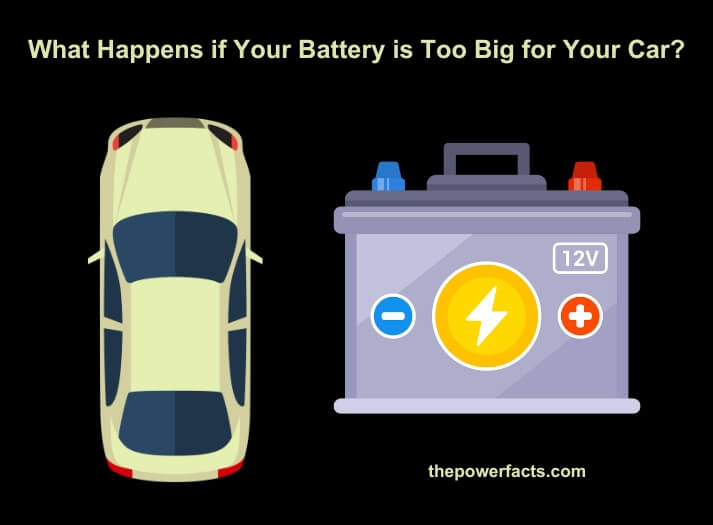We’ve all heard the saying “go big or go home,” but when it comes to car batteries, bigger isn’t always better. If you’ve ever wondered, “What happens if your battery is too big for your car?” you’re in the right place. In this comprehensive guide, we’ll explore the potential consequences of using an oversized battery in your vehicle, weigh the pros and cons, and provide helpful tips on choosing the right battery size for your car. So buckle up and let’s dive in!

The Effects of an Oversized Battery on Your Car
There’s more to car batteries than meets the eye. When you’ve got a battery that’s too big for your car, it can lead to a myriad of issues, some of which are:
1. Physical Space Constraints
- Limited room in the engine compartment
- Difficulty fitting the battery securely
- Increased risk of damage to surrounding components
2. Performance Issues
- Incompatibility with the car’s electrical system
- Reduced fuel efficiency
- Increased wear and tear on the alternator
3. Safety Concerns
- Potential for electrical shorts or fires
- Compromised vehicle handling due to added weight
- Increased risk of acid leaks
Now that we’ve covered the possible outcomes, let’s dive into the nitty-gritty of each issue.
The Nuts and Bolts: Exploring the Problems in Detail
Physical Space Constraints
It might seem like a no-brainer, but if your battery is too big for your car, it simply won’t fit properly. Shoehorning a larger battery into a tight space can result in:
- Hindered access to other engine components
- Inability to secure the battery properly, increasing the risk of it moving around while driving
- Potential damage to nearby components due to constant contact or pressure
Performance Issues
Car manufacturers design vehicles with specific electrical systems, and using a battery that’s too big can throw a wrench in the works. Potential performance problems include:
- Overloading the electrical system, causing fuses to blow or electrical components to fail
- Reduced fuel efficiency due to the added weight of the larger battery
- Extra strain on the alternator, leading to premature wear or failure
Safety Concerns
Safety should always be a top priority, and using an oversized battery can create several risks, such as:
- Electrical shorts or fires if the battery’s terminals come into contact with metal components
- Compromised handling due to the added weight, affecting braking and cornering capabilities
- Acid leaks from an improperly secured battery, which can cause corrosion or damage to the engine compartment
Weighing the Pros and Cons of an Oversized Battery
It’s not all doom and gloom with oversized batteries. There are a few potential benefits to consider, such as:
Pros
- Increased reserve capacity, providing extra power for accessories or in case of alternator failure
- Longer battery life due to less frequent deep discharging
- Greater cranking power, which can be helpful in extreme temperatures or for high-performance vehicles
However, the potential downsides must also be taken into account:
Cons
- Difficulty finding a secure fit in the engine compartment
- Incompatibility with the car’s electrical system
- Reduced fuel efficiency, increased wear on the alternator, and potential safety concerns

Frequently Asked Questions
- How can I tell if my battery is too big for my car?
To determine if your battery is too big for your car, first consult your vehicle’s owner’s manual for the recommended battery size and specifications. If your current battery exceeds those recommendations, it’s likely too big for your car.
- Can I use a bigger battery if I make modifications to my car?
While it is possible to modify your car to accommodate a larger battery, it’s generally not recommended. Altering your vehicle’s electrical system can lead to unforeseen issues, void warranties, and potentially reduce the resale value of your car.
- How can I choose the right battery for my car?
The best way to choose the right battery for your car is to follow the manufacturer’s recommendations found in your owner’s manual. You can also consult a trusted mechanic or visit an auto parts store to ensure you’re getting a battery that fits your car’s needs.
The Bottom Line
In a nutshell, using a battery that’s too big for your car can lead to a host of problems, including physical space constraints, performance issues, and safety concerns. While there may be some benefits to using an oversized battery, such as increased reserve capacity or cranking power, these advantages are generally outweighed by the potential downsides.
When it comes to car batteries, it’s always best to stick to the manufacturer’s recommendations and choose a battery that’s designed to fit your vehicle’s specifications. By doing so, you’ll ensure that your car runs smoothly, efficiently, and safely – and who wouldn’t want that?
Relevant Resources: